#78 (tie): 'A Matter of Life and Death': The Reveal discusses all 100 of Sight & Sound’s Greatest Films of All Time
Our journey through the hundred greatest movies takes a side trip to the afterlife via a romantic Michael Powell and Emeric Pressburger classic.
#78 (tie): A Matter of Life and Death: The Reveal discusses all 100 of Sight & Sound’s Greatest Films of All Time
On December 1st, 2022, Sight & Sound magazine published “The Greatest Films of All Time,” a poll that’s been updated every 10 years since Bicycle Thieves topped the list in 1952. It is the closest thing movies have to a canon, with each edition reflecting the evolving taste of critics and changes in the culture at large. It’s also a nice checklist of essential cinema. Over the course of many weeks, months, and (likely) years, we’re running through the ranked list in reverse order and digging into the films as deep as we can. We hope you will take this journey with us.
A Matter of Life and Death (1946)
Dir. Michael Powell, Emeric Pressburger
Ranking: #78 (tie)
Previous rankings: #92 (2012).
Premise: In 1945, squadron leader Peter Carter (David Niven), a Royal Air Force pilot, is flying a badly damaged bomber that’s plunging toward the English Channel. His co-pilot is dead and all the other parachutes have been distributed to his crew, whom he’s ordered to bail out. In his last moments, he speaks to June (Kim Hunter), an American radio operator, and the two share an instant rapport. Peter should have died, but his escort to the Other World, a Frenchman named Conductor 71 (Marius Goring), misses him in the fog and he wakes up alive on the beach. As Peter meets June in the flesh and the two begin their improbable relationship, he starts to get visitations from Conductor 71, who tries to correct this unfortunate error and bring him to the afterlife as scheduled. Concerned over these seeming hallucinations, June reaches out to her friend Frank (Roger Livesey), a local doctor with neurological expertise who seeks out a surgery to set Peter’s mind straight. But a twist of fate places Peter on trial in the Other World, with Frank as his defense counsel, arguing for his right to stay with June on Earth.
Scott: The 2022 Sight & Sound poll looked affectionately on the films of Michael Powell and Emeric Pressburger, with The Life and Death of Colonel Blimp and I Know Where I’m Going! tied at #196, Black Narcissus at #169, and two in the Top 100, A Matter of Life and Death here and The Red Shoes for us to look forward to reasonably soon at #67. But with A Matter of Life and Death specifically, I see it more in the context of other romantic films on the list, like Chungking Express, Journey to Italy, Casablanca, Portrait of a Lady on Fire, In the Mood For Love, etc. Basically: What are the films that make critics swoon? And I think, in most cases, these are love stories where the passion between two people are pitted against formidable opposition within the setting—social mores or wartime obligations or, in this case, the rigid inventories of the afterlife. Sometimes love can transcend these restrictions and sometimes it has to be sacrificed, but what matters to us as viewers is to see it tested and feel its power. We’ll settle for heartbreak if we’re made to care about the heartbroken.
I’m tempted to focus this piece of the conversation entirely on the opening minutes of A Matter of Life and Death, because they’re the reason why this film is on the list. If we don’t believe that Peter and June can fall in love—or at least develop very strong feelings for each other—within the short time Peter is careening toward certain death in the Atlantic, then the rest of the film does not have much resonance at all. The excuse Conductor 71 gives for not scooping up Peter as intended is that he got “lost in the fog,” but it certainly feels like destiny itself is hiding him away. Then again, Powell and Pressburger are inviting us from the opening titles to think about A Matter of Life and Death as an extended fantasy—from which, perhaps, we might simply refuse to awake: “This is a story of two worlds. The one we know and another which exists only in the mind of a young airman whose life and imagination have been violently shaped by war.”
Yet it’s not violence but a peaceful resignation that has overcome Peter as he makes his deadly descent, and he begins his conversation with June by quoting the first stanza to the Sir Walter Raleigh poem “The Pilgrimage”:
GIVE me my scallop-shell of quiet,
My staff of faith to walk upon,
My scrip of joy, immortal diet,
My bottle of salvation,
My gown of glory, hope's true gage;
And thus I'll take my pilgrimage.
Raleigh wrote that poem as he awaited execution, and it’s an indicator of Peter’s sanguine tone before his own imminent death, which David Niven projects with such charm and wit and nobility that we can see why June is so enamored with him. His one request to June is to let his mother know that he loved her until the very end—a sentiment he was never able to express during life—but he wants to stay in the moment. “Let me do this in my own way,” he tells her. “I want to be alone with you, June.” By the end, June tells Peter that she could love a man like him and we believe it. And when they meet again, miraculously, near the beach where he washes ashore, they kiss on the spot. The getting-to-know-you phase is over almost as quickly as it started.
There are moments of movie magic throughout A Matter of Life and Death, when Powell and Pressburger fiddle playfully with frozen moments out of time or toggle between the black-and-white of the Other World and the Technicolor of our world. But their confidence in creating the necessary magic between Peter and June in such a short time frame is so incredible that it’s worth breaking down. It starts with a narrator emphasizing the vastness of the universe itself (which ends up larger than heaven, incidentally), including a wry joke about a faraway nova. (“Someone must have been messing about with the uranium atom!”) But then we land on close-ups in two intimate environments: Peter in the cockpit with his co-pilot Bob dead to the side, with flames raging from the wing of his bomber in the background, and June on the other end, talking into her radio. The contrast between this heightened moment before Peter’s death and his absolute calm (and airman’s swagger) in the face of it strikes a tone that disarms June and the audience in kind.
How can we not be intrigued by his courage and perspective in a spot where we would expect a man to panic? That he wants to spend his last moments on Earth making some small connection to a stranger is special in itself, but it’s made more so by World War II, which like all wars has distanced mankind from its humanity. The conversation between Peter and June takes up almost exactly five minutes of screen time. Five minutes!
Obviously, the movie keeps going, so I’m happy to talk about all the wonderful things that follow. But were you as thunderstruck by those five minutes as I am (and maybe all those Sight & Sound critics were)? What’s the secret sauce here? Why does this film, which seems so locked into the post-war mood, continue to be this resonant?
Keith: Oh, I’m with you. The opening of this film, and I’m including that long, animated tour of the universe, is as stunning as the opening of any film I know. And you’re right that it has to be: you have to feel the intensity of the flames outside the cockpit of Peter’s plane and of the relationship formed over radio, and every aspect of the moment makes it work, from the performances to the glow of lights at June’s radio station. The moment that makes my heart catch in my throat is when Peter says, “I love you June. You’re life and I’m leaving you.” This is about the love between two people but it’s about more than that, too.
And I think that’s why it’s proven so enduring. Powell and Pressburger made A Matter of Life and Death at the end of a string of death-filled years and it plays like a love letter to life itself. Beyond the opening scene, it’s the choice to present life on Earth as bursting with color and movement and the Other World as stark and staid that makes the film. The afterlife is… fine. Seems like a nice place and everyone there appears to be content enough. But it’s not where you really want to be until your time’s up (and even then it seems a bit like a kind of infinite coda to the earthly existence you left behind).
As with the Other World journey, the film asks viewers to buy into the unfairness of cutting this romance short at this particular moment. In trying to prove his love for June, Peter finds himself in a bit of a Catch 22. He really hasn’t had a chance to prove it because of the briefness of their time together. That anyone watching the film knows that the end of the war is just around the corner and, with luck, they can spend the rest of their lives in a more peaceful world—or at least one that does its best to suppress Nazis, as all right-thinking places should—make it seem all the more unjust. Peter’s death would be untimely in a couple of different senses.
As much as I love this film, I do feel it slows down a bit in the trial segment during the stretch when Frank has to defend England against the attacks of Abraham Farlan (the always great Raymond Massey), the first casualty of the Revolutionary War. There’s just a bit too much of this, but I do appreciate it as a window into wartime Anglo/American tensions. For all the timeless elements we’ve touched on, it’s a movie of its moment, a point in history that produced quite a few films about the afterlife and angelic intervention: Here Comes Mr. Jordan, Heaven Can Wait, The Bishop’s Wife (also with Niven) and, of course, It’s a Wonderful Life. How do you see A Matter of Life and Death fitting into that tradition? And does wartime explain the preponderance of these? Also, am I off base in not loving the English/Yank sparring of the trial scene as much of the rest of the movie?
Scott: When we talk about classic films here—and certainly when we talk about classic films that have been canonized by the Sight & Sound list—we generally take it as a given that they’re timeless, resonant to viewers now and in the foreseeable future. And that’s true to an extent of A Matter of Life and Death: Who wouldn’t swoon at the fire-in-a-bottle romance between Peter and June? Or luxuriate in the black-and-white and Technicolor worlds that Powell/Pressburger create? Or chuckle at the wit and extremely British deftness of the whole enterprise?
But I think you’re right in suggesting that the wartime context means quite a lot of this movie and it surely had a special impact on a war-weary public that craved some relief. Audiences could tap into the fantasy of one less life lost in the waning days of the war, and the additional fantasy, as you note, that life on Earth is the one bursting with color. In the middle of Peter resuming (and defending) his life, the film makes a point of relieving him from duty. He does not have to report again to his commanding officer, despite looking remarkably healthy for a man who tumbled out of a burning plane without a parachute. It’s time to turn the page on the darkest chapter in modern history.
I suppose I agree with you that the trial section of A Matter of Life and Death is not as compelling as other sections of the film, raising as it does the surprising centuries-old tension between America and Britain. But even this part has plenty of amusing moments, like a jury stocked with a variety of people who have some historical beef with Britain, including representatives from France, India and Ireland, as well as players in the Boer War and the Crimean War. (A confident Frank has them all replaced by Americans, who will presumably align with Abraham Farlan, but opt toward a future built on friendship and love.) Massey’s fiery performance as Farlan makes him a perfect foil for Livesay’s even-tempered Frank, however, and I love some of their exchanges in court. (Frank: “Sir, may I bring you up to date? We are living in the 20th century, not the 18th.” Farlan: “May I bring you up to date? We are not alive at all.” Touché.)
I’m intrigued, as you are, by the film’s depiction of the afterlife, which doesn’t seem all that appealing from what we glimpse of it. I was reminded several times throughout the film of Albert Brooks’s great Defending Your Life, which owes a debt to A Matter of Life and Death on several fronts, not least in fiddling with our rosy preconceptions about what the Other World looks like. There are aspects of Brooks’s Judgment City—a kind of celestial waystation where souls are redirected to various destinations in the universe—that are obviously enticing, especially the fast-and-delicious, all-you-can-eat restaurant options. (The comedy clubs should be avoided, however.) But there’s also a funny aspect where the powers-that-be have guessed at what environment humans would find most comfortable and have come up with office parks, strip malls, and hotels of varying quality.
A Matter of Life and Death doesn’t spend nearly as much time in its monochrome afterlife, but the biggest creature comfort on offer for the newly ascendant is a cool bottle of soda. The emphasis here is more on the processing of lives: Thousands of newly dead are heading up the escalator at all times and so they’re outfitted much like you’d imagine men going to war. Instead of standard-issue rifles and uniforms, they’re handing a set of angel wings in clear packaging—some assembly required. The bureaucratic homogeneity of the Other World is hugely unappealing, as is the tribalism that continues to exist there as it does on Earth. When a gallery of infinite souls are seated for the trial—uncomfortably seated, I should add—they’re all in ethnic/nationalist packs. At least on Earth, we have a couple from separate ends of the Atlantic.
What about you, Keith? Anything about the Other World seem enticing? And what is the Powell/Pressburger touch here? The special effects are part of it for sure, but the tone of the film, dry in wit yet big-hearted, seems appropriate to them, too.
Keith: I feel like I should clarify my (quite mild) criticism above. In some respects, the tension between what’s American and what’s English and whether or not the two could enjoy any kind of union after World War II is the driving force behind the film. A Matter of Life and Death was born in part of a government suggestion that Powell and Pressburger might want to make a film that could help smooth out some wartime tensions and the question of what England and America were to be, separately and together, is woven into the plot. That provides a rich subtext that runs throughout the film. It’s just in that moment, when it stops being subtext and becomes just text, that feels a little off to me. Though it might be worth noting that the film’s American and English distributors couldn’t even agree on a name. It was first released here as “Stairway to Heaven.” (Not a bad title. Someone might want to use it for a song or something.)
Like I said, the Other World seems perfectly fine, if a bit lacking in excitement. But I think you make a good point in revealing its flaws, particularly when you note that everyone still hangs out in cloistered groups even in this place where past differences should be put behind them. They may boast of only rarely making mistakes, but they certainly haven’t gotten it all figured out, have they? If we can extrapolate a metaphysical takeaway, it might be this: It’s our job to address and eliminate these problems on Earth. The Other Place can only reflect our own accomplishments.
As for the Powell and Pressburger touch, you’re right about the dry wit and big-heartedness, but I’d add the ways The Archers make those elements compatible with big, serious matters. The title A Matter of Life and Death is no joke, nor is the recent history in which it takes place. It’s a difficult balance to pull off, akin to the contradictory feelings stirred in a film like The Life and Death of Colonel Blimp, which has a central character that could be only an antiquated buffoon, as he was in the comic strip that inspired the movie. Instead he’s an antiquated buffoon who’s also a complex, endearing character invested with all the complexities and contradictions of a whole era of English history.
Beyond the special effects, there’s the look of the film. I immediately think of cinematographer Jack Cardiff and his stunning use of Technicolor when I think of The Archers but, believe it or not, they only made three films together with Cardiff as cinematographer. (He previously worked on The Life and Death of Colonel Blimp as the second unit Technicolor camera operator.) This is the first—Black Narcissus and The Red Shoes would follow—and it’s stunning in both its monochrome stretches (which were shot in Technicolor then processed without the color layers) and especially in its color scenes.
“One is starved for Technicolor up there,” Conductor 71 sighs early in the film. I’ve always thought of Technicolor as a place where movies improved on real life. I’d love to live in a world with the hues of this film (though my go-to remains the look of The Trouble with Harry), and I think Conductor 71 understands the feeling. (Ian Christie points out in his Criterion Collection commentary that Goring clearly mouths “color” in the scene. “Technicolor” was dubbed in later.) This creates a weird kind of contradiction though, doesn’t it? It’s a film that contrasts the beauty and richness of Earth with the starkness of the Other World, but it’s a not-exactly-real Earthly beauty being celebrated. Maybe this kind of paradise can only be found in movies. (At the very least, Frank’s camera obscura has raised the issue of what it means to experience life through a medium.)
We should talk a bit about the performances. The film was a big deal at the time in part because David Niven had been away from movies due to his own war service. Niven was ten years older than Peter when he made the movie, but it doesn’t matter. The performance probably benefits from his ability to draw on his own wartime experience for the role, beyond having the inherent advantage of being, you know, the handsome and charming David Niven. Again going back to that opening scene, the resolve and good humor with which he meets his certain death gives the moment incredible power. And he’s nicely matched by Kim Hunter at the beginning of her long career. They give the sort of performances that make it hard to imagine anyone else being cast in their roles (just as it's hard to imagine Michelle Pfeiffer in The Silence of the Lambs or Tom Selleck in Raiders of the Lost Ark).
Scott, any more thoughts on the leads? I’ve left a lot of supporting performances for you to talk about. Also, I wonder if in an odd way this film has benefitted from being a little hard to find over the years, at least in the States (where it was first released as Stairway to Heaven). I recall its re-release being a big deal in the 1980s and again when it was restored in 2018. But as I write this, it can currently only be streamed on, oddly enough, Tubi, and in what appears to be perfectly fine quality. (Tubi’s also home to the once-elusive Truffaut films The Wild Child and Mississippi Mermaid, FYI.) It’s already a special movie, but has this given it an extra layer of specialness? (I know I’ll never part with my Blu-ray.)
Scott: A revealing Sight & Sound poll stat for you: Of the 35 critics who voted for A Matter of Life and Death in the 2022 poll, 28 of them are from the UK—and one American we both know, The Atlantic’s David Sims, has UK roots. It perhaps speaks to the national importance of this film—and of The Archers in general—that the film has placed this highly and it may also account for the dodgy availability in the States. (I don’t have the Criterion disc and it’s currently off the Criterion Channel, so I re-watched it on the just-fine Tubi stream.)
To circle back to your thoughts on the appeals of Earth versus the Other Place, it seems important to me that the Other Place is depicted as another small blip in the larger universe, not the destination for all souls on all planets or a location that transcends the space-time continuum altogether. I like your idea that the Other Place “can only reflect our own accomplishments,” because it redirects the focus to what is happening on Earth. And there, I think the film has a prevailing optimism, reflected in that bigger-than-life Technicolor, in the generosity and spirit of every single character, and in a love story between a Brit and an American that defies death. Life is sweet after the war– friendships are strengthened, historical beefs are dropped, romance is in the air, and the world literally looks better than it did before.
As for other performances I admired, I appreciate you leaving me Marius Goring as Conductor 71, who is just so delightfully and flamboyantly French, making him an ideal sparring partner for Niven’s more measured Brit. He teases Peter from the start about losing him in his “ridiculous English climate,” but seems in no great hurry to push Peter into accepting his intended fate. He wants to be a partner to Peter, too, like that long sequence on the escalator, where he offers Plato and Socrates as defense attorneys, or when he gives him a chance to meet the greatest chess player who ever lived. (“A Frenchman, naturellement!”)
One more note: Whenever Conductor 71 swoops in to talk to Peter, time stops, which of course is a fun effect when Frank and June are playing ping pong. But the last time this happens, when Peter declares his love for June (“We were born thousands of miles apart, but we were made for each other”), a single tear appears miraculously on her frozen face. It’s the only piece of evidence that can be used in court. And it’s the only piece of evidence that matters. Swoon, am I right?
Keith: This movie, man. Before we move on entirely, one bit of trivia and a bit of praise: Goring wanted to play the Niven part, if you can imagine that. (He’d probably be fine. Very talented guy. But still hard to picture given how great he is as Conductor 71.) And I don’t want to wind this down without some praise for the square-shouldered, memorably mustachioed Roger Livesey, an actor central to three Powell and Pressburger movies who brings an extraordinary sense of compassion and intelligence to his work as Frank.
Next, we’re still working our way through the many films tied for 78th place on the list, a journey that will find us crossing the English Channel for another film that’s gone in and out of circulation over the years (and one I’ll confess to never having seen):
Next: Celine and Julie Go Boating (1974)
Previously:
#95 (tie): Get Out
#95 (tie): The General
#95 (tie): Black Girl
#95 (tie): Tropical Malady
#95 (tie): Once Upon a Time in the West
#95 (tie): A Man Escaped
#90 (tie): Yi Yi
#90 (tie): Ugetsu
#90 (tie): The Earrings of Madame De…
#90 (tie): Parasite
#90 (tie): The Leopard
#88 (tie): The Shining
#88 (tie): Chungking Express
#85 (tie): Pierrot le Fou
#85 (tie): Blue Velvet
#85 (tie): The Spirit of the Beehive
#78 (Tie): Histoire(s) du Cinéma





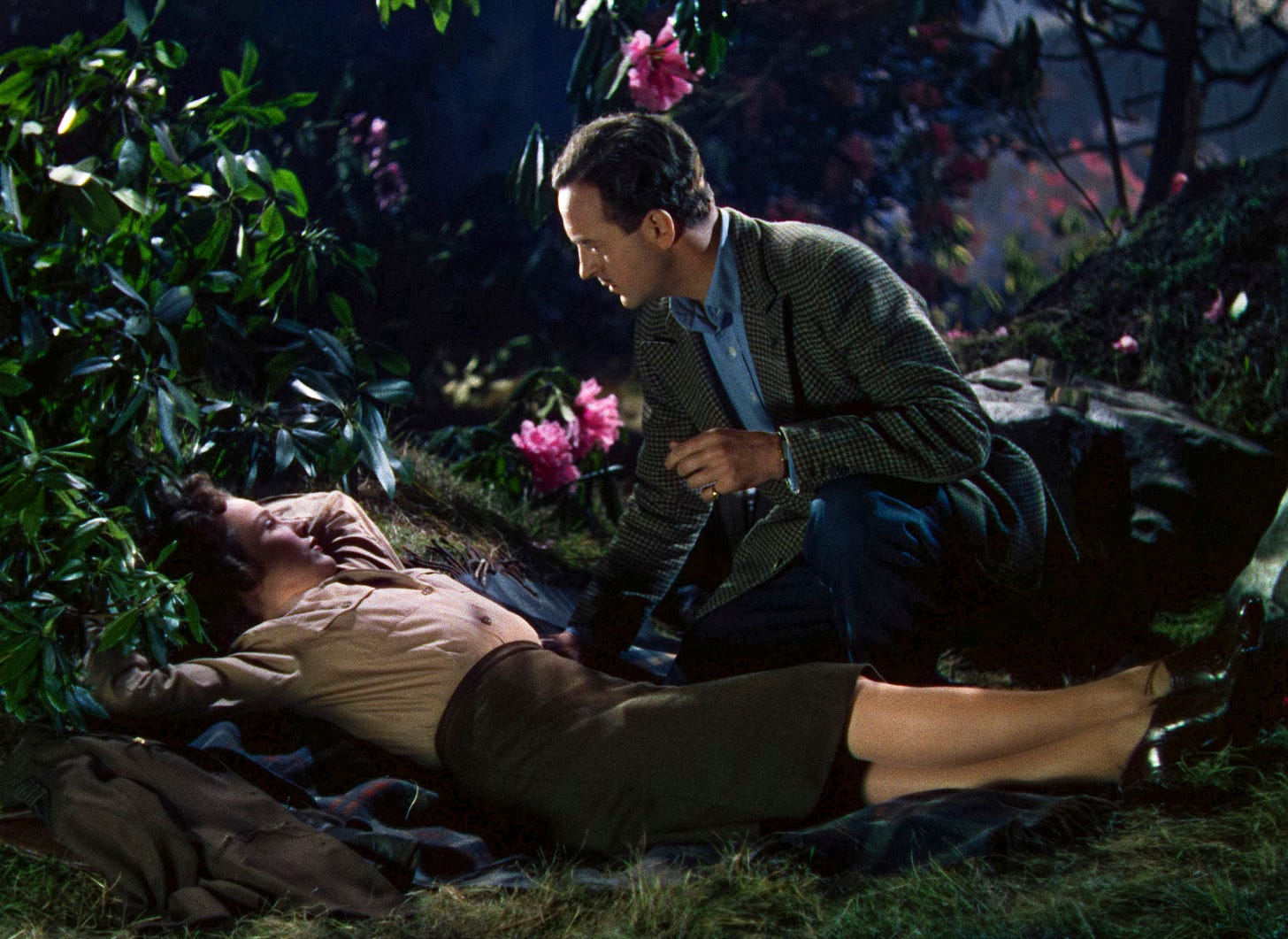
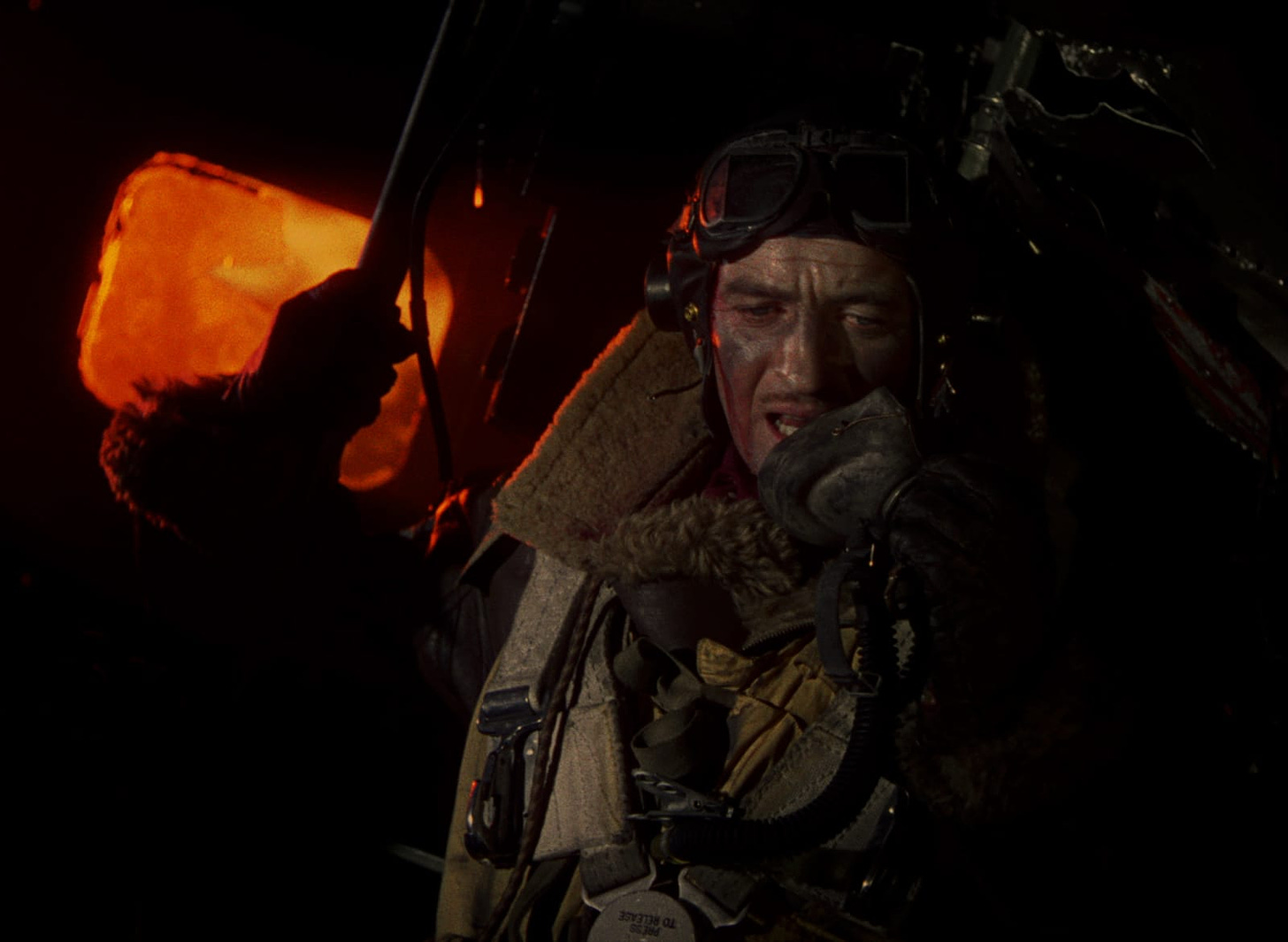
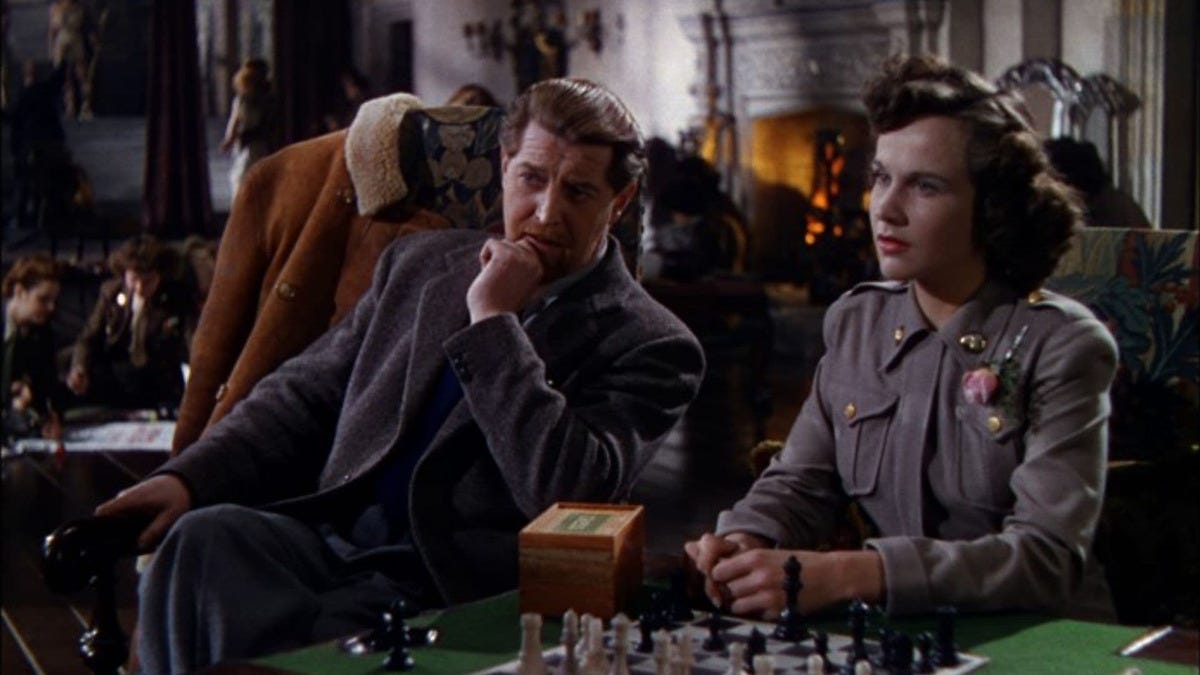
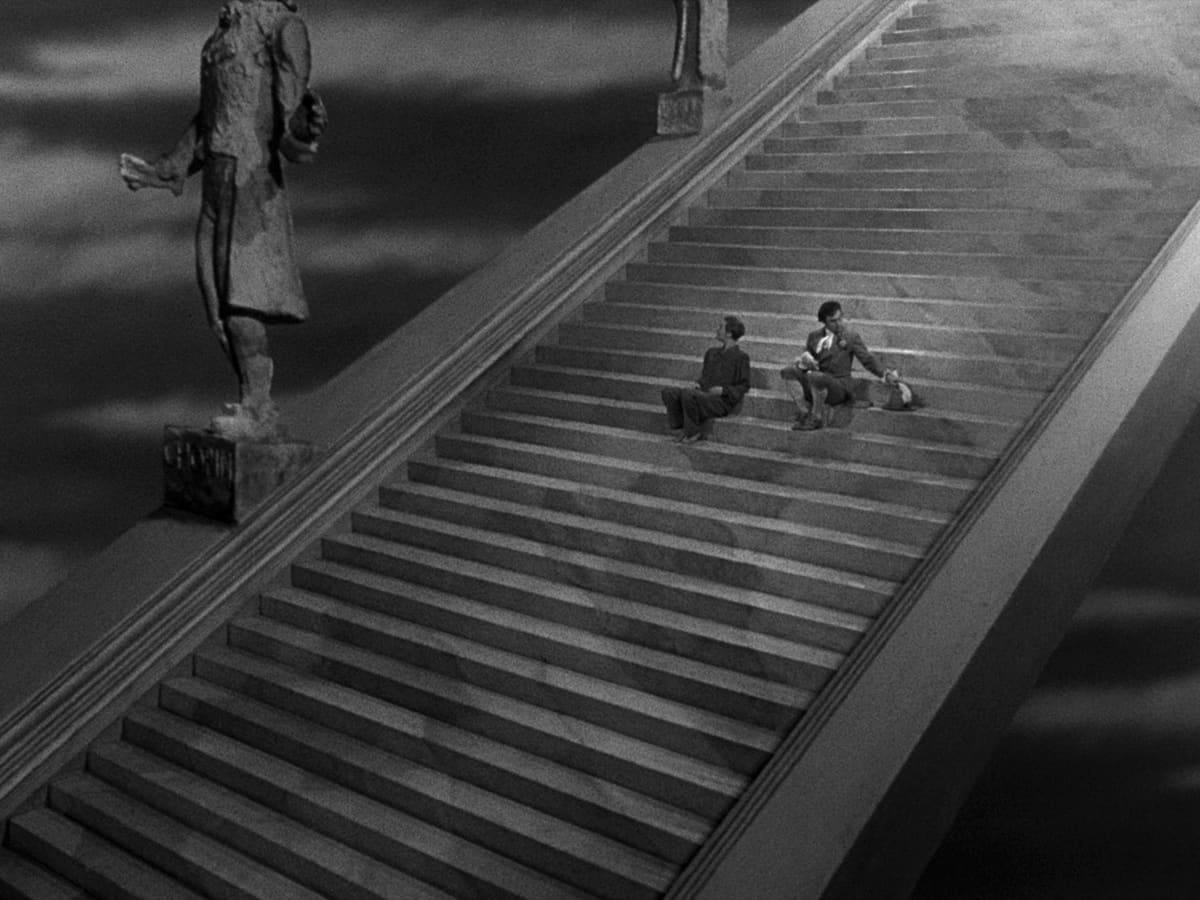

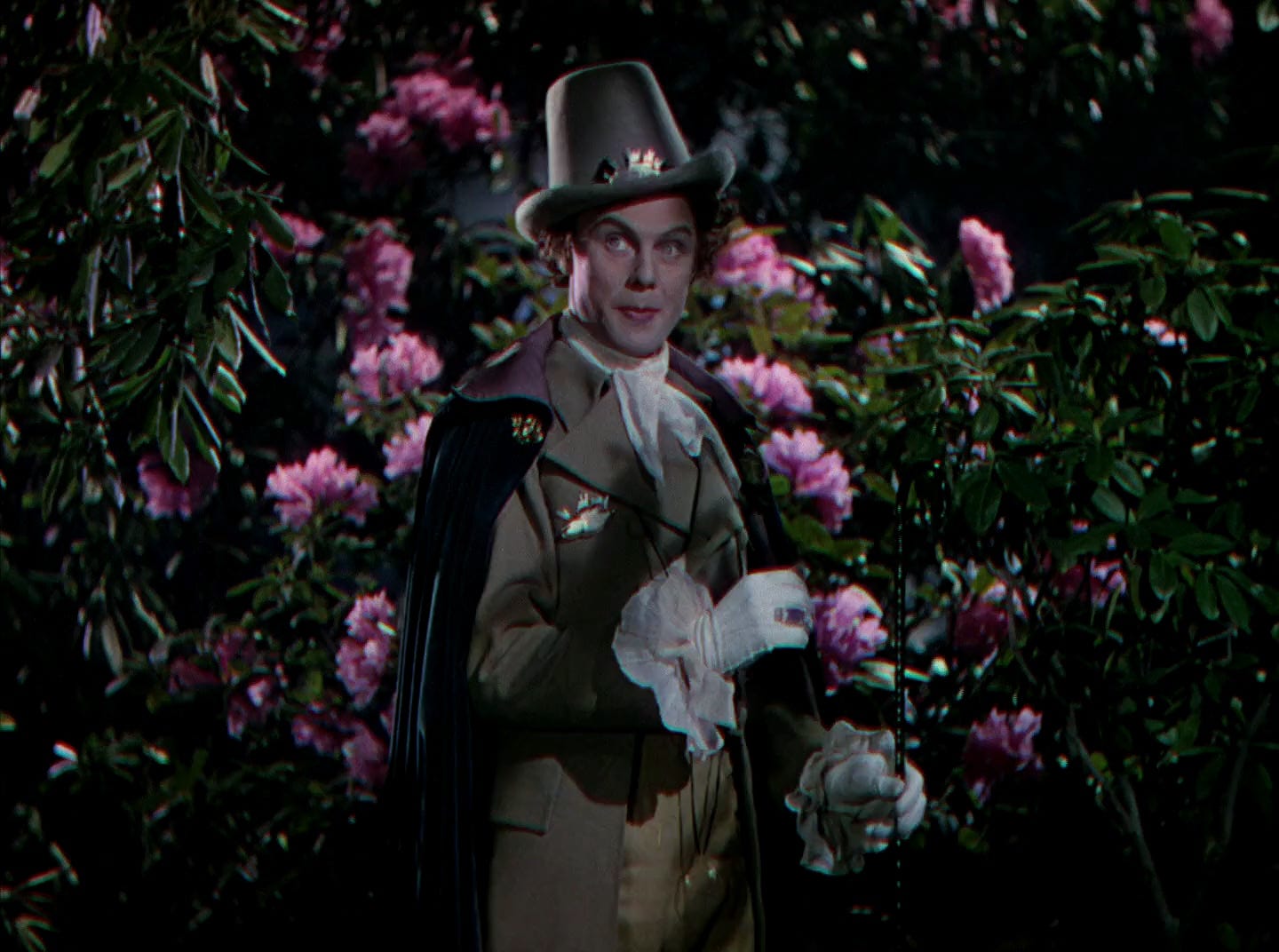
Back in the days of The Dissolve we did a column called "You Must Watch" where we talked to a notable person about a movie they wanted everyone to watch. I interviewed the comic book (and now MONARCH: LEGACY OF MONSTERS) writer Matt Fraction about this movie and remember it being a great, smart conversation. But I cannot find it online. If anyone more search-savvy than I knows how to dig it up, I'd love the help and to be able to link to it as supplemental reading.
This is my favorite film of all time, so I'm a bit biased. I find I can't put it on without almost immediately getting very emotional. That opening scene is certainly part of it. But I also think it's the film's insistence that life and love is the most beautiful thing we're likely to encounter (a shocking and probably naive thesis coming right out of WW2, but damn if the film doesn't stick to it) and heaven, if it exists, which it probably doesn't outside Peter's mind, couldn't possibly compare to the beauty of being alive.
Alas, a quick Google search of "best atheist films" or even "best humanist films" reveals a lot of Ricky Gervais nonsense, but no one ever has the imagination to include a film that spends this much time in the afterlife.
As for that trial sequence, that I'll admit seems like it belongs in an entirely different film, the idea of Powell and Pressburger saying "Yes, yes, the romance is lovely but now lets take a few minutes and get weird with it" only seems to further endear the film to me. It's as if Peter's life just can't escape the ever-presence of geo-political conflict (I suppose none of ours can, which makes an appreciation of being alive even more essential).
My favorite dialogue is a more subtle exchange (and I'm paraphrasing despite having seen this film a dozen times):
Dr. Reeves: How did your father die?
Peter: Same way I did.
Dr. Reeves: Brain?
Peter: War.